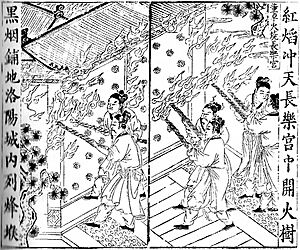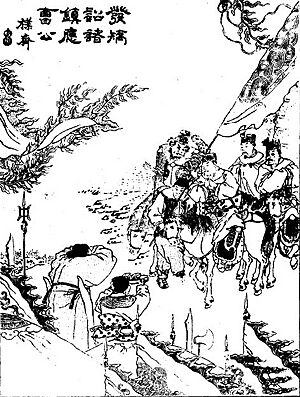Campaign against Dong Zhuo facts for kids
Quick facts for kids Campaign against Dong Zhuo |
|||||||
|---|---|---|---|---|---|---|---|
| Part of the wars at the end of the Han dynasty | |||||||
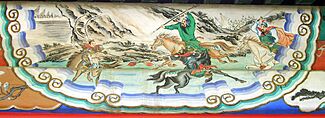 A mural in Fragrant Hills showing the duel between the three sworn brothers and Lü Bu at Hulao Pass in a fictional story. |
|||||||
|
|||||||
| Belligerents | |||||||
| Guandong Coalition | Dong Zhuo | ||||||
| Commanders and leaders | |||||||
| Yuan Shao Cao Cao Yuan Shu Sun Jian<2br>Zhang Miao Han Fu Bao Xin Yuan Yi Zhang Chao Zhang Yang Ma Teng Yufuluo Kong Zhou Wang Kuang Liu Dai Qiao Mao Liu Bei |
Dong Zhuo Lü Bu Li Jue Guo Si Hua Xiong † Xu Rong< Hu Zhen Zhang Ji Niu Fu Fan Chou Li Ru |
||||||
| Strength | |||||||
| 100,000+ | Described as less than coalitions' | ||||||
| Campaign against Dong Zhuo | |||||||
|---|---|---|---|---|---|---|---|
| Traditional Chinese | 董卓討伐戰 | ||||||
| Simplified Chinese | 董卓讨伐战 | ||||||
|
|||||||
The Campaign against Dong Zhuo was a military action by a group of regional leaders and warlords against the powerful warlord Dong Zhuo. It happened in 190, near the end of the Eastern Han dynasty in China. The leaders of this group, called the coalition, believed that Dong Zhuo was trying to take over the throne. He had taken Emperor Xian as a hostage and gained a lot of power in the government.
The coalition wanted to remove Dong Zhuo from power. This campaign led to the capital city, Luoyang, being emptied and burned. The emperor and the government then moved to Chang'an. This event was an important step towards the end of the Han dynasty and the start of the Three Kingdoms period.
In the famous 14th-century novel Romance of the Three Kingdoms, this campaign is known for two exciting, but fictional, events. One is Guan Yu defeating Hua Xiong. The other is a three-on-one fight between the three sworn brothers (Liu Bei, Guan Yu, Zhang Fei) and Lü Bu. These scenes are often shown in Chinese opera. Historically, Hua Xiong was defeated by Sun Jian. Also, Liu, Guan, and Zhang were part of the campaign, but there is no record of them fighting Lü Bu. Lü Bu was actually defeated by Sun Jian in battle.
Contents
Why the Campaign Started
After Emperor Ling died in 189, a powerful general named He Jin called a frontier general, Dong Zhuo, to the capital city of Luoyang. He Jin wanted Dong Zhuo to help him get rid of a group of powerful palace officials called eunuchs. However, before Dong Zhuo arrived, He Jin's plan was discovered. The eunuchs assassinated He Jin on September 22, 189.
He Jin's friends, led by Yuan Shao, then attacked the palace and killed many eunuchs. During this chaos, the young Emperor Shao and his younger brother, the Prince of Chenliu, were taken out of the palace by the remaining eunuchs. The emperor lost the Imperial Seal during his escape. Dong Zhuo and his soldiers later found them and brought them safely back to the palace.
Soon after, another warlord named Ding Yuan was killed by his own officer, Lü Bu. Ding Yuan had opposed Dong Zhuo's plan to remove Emperor Shao from the throne. Lü Bu then joined Dong Zhuo.
In 190, Dong Zhuo removed Emperor Shao and put the Prince of Chenliu on the throne instead. This prince became known as Emperor Xian. Dong Zhuo made himself the Chancellor of State, a very high position that had not been used for almost 200 years. On March 26 of the same year, Dong Zhuo had the former Emperor Shao and Empress Dowager He killed.
Dong Zhuo then became very powerful in the government. He acted like a dictator, making all the big decisions without asking the emperor. He also got rid of anyone who disagreed with him to make his power even stronger. Yuan Shao had fled from Luoyang after openly disagreeing with Dong Zhuo. Dong Zhuo worried that Yuan Shao might start a rebellion. So, Dong Zhuo tried to make peace by appointing Yuan Shao as the Grand Administrator of Bohai.
Key Events of the Campaign
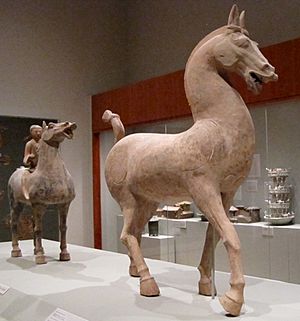
Forming the Coalition
Even with his new title, Yuan Shao was not happy with Dong Zhuo. He planned to start a rebellion to remove Dong Zhuo. But Han Fu, the Governor of Ji Province, kept him from acting too quickly.
At the same time, the Grand Administrator of Dong Commandery, Qiao Mao, wrote fake letters. These letters accused Dong Zhuo of being a traitor who wanted to take the throne. They called for a military campaign against him. These letters were sent all over the country. Many regional officials and warlords answered the call to remove Dong Zhuo.
In February 190, the Guandong Coalition (meaning "Coalition East of the Pass") was formed. Several regional leaders and their armies gathered east of Hangu Pass to fight Dong Zhuo. Yuan Shao was chosen as the leader of this coalition. Forces led by Sun Jian and Cao Cao also joined the campaign.
The main members of the coalition included:
- Yuan Shu, a powerful general.
- Han Fu, Governor of Ji Province.
- Kong Zhou, Inspector of Yu Province.
- Liu Dai, Inspector of Yan Province.
- Wang Kuang, Grand Administrator of Henei.
- Yuan Shao, Grand Administrator of Bohai.
- Zhang Miao, Grand Administrator of Chenliu.
- Qiao Mao, Grand Administrator of Dong Commandery.
- Yuan Yi, Grand Administrator of Shanyang.
- Bao Xin, Chancellor of Jibei.
- Zhang Chao, Grand Administrator of Guangling.
- Zhang Yang, Grand Administrator of Shangdang.
- Yufuluo, a leader of the Southern Xiongnu people.
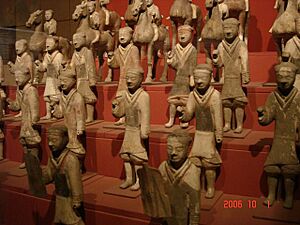
The coalition armies set up camps in several places east of Luoyang, surrounding the capital. This blockade stopped supplies from the eastern part of the Han empire from reaching the capital. This greatly reduced the government's tax money. To get more money, Dong Zhuo melted down nine large bronze statues and other treasures to make new coins. These new coins caused a lot of inflation, meaning prices went up everywhere.
Even though the coalition looked strong, most of their armies were made of family guards and people looking for loot. They didn't have much battle experience. Dong Zhuo's soldiers, however, were tough frontier fighters who had fought in the Liang Province Rebellion.
Burning Luoyang
Dong Zhuo was worried about the coalition. He suggested that the capital city of Luoyang should be emptied right away. The government and the emperor would move to Chang'an in the west. All civilians also had to move to Chang'an. Only Dong Zhuo and his army would stay behind to defend Luoyang.
Other government officials strongly disagreed with Dong Zhuo's plan. But Dong Zhuo removed anyone who opposed him. On April 9, 190, Dong Zhuo's plan was put into action. He ordered his soldiers to rob and kill people in the rich homes of Luoyang. Then, he forced the people of Luoyang to move towards Chang'an. Emperor Xian, nobles, and officials also had to go. Anyone who refused to leave was killed. Dong Zhuo also ordered Lü Bu to raid ancient tombs for valuables. After everyone left, Luoyang was set on fire and completely destroyed. Records say that "the numbers of the innocent dead were beyond measurement."
In Suanzao, Cao Cao led his soldiers west to attack Dong Zhuo's forces. He was joined by some of Zhang Miao's army. Cao Cao's army was defeated by Dong Zhuo's general, Xu Rong, in the Battle of Xingyang. Cao Cao himself was hurt. Cao Hong gave his horse to Cao Cao, and they escaped on foot. Xu Rong then pulled back his troops.
When Cao Cao returned to Suanzao, he suggested that the coalition should chase Dong Zhuo's retreating forces. This would show Dong Zhuo that the coalition was still strong. However, Zhang Miao and the others disagreed. Cao Cao then left to join Yuan Shao in Henei. After Cao Cao left, the coalition forces in Suanzao ran out of supplies and broke apart. Liu Dai took the chance to kill Qiao Mao, whom he disliked.
At the same time, Dong Zhuo sent important men to Yuan Shao to try and make peace. But Yuan Shao arrested and killed all of them except one. Seeing that peace was not possible, Dong Zhuo quickly surrounded Wang Kuang's camp north of Luoyang. He defeated Wang Kuang so badly that Wang left the coalition and fled home.
Sun Jian's Victories
In Luyang to the south, Sun Jian joined Yuan Shu with 20,000 to 30,000 soldiers. Yuan Shu made Sun Jian the vanguard, meaning the first to attack. Sun Jian began training his men in Luyang.
In the winter of 190, Dong Zhuo sent about ten thousand soldiers to attack Luyang. Sun Jian's men were having a party, but Sun Jian stayed calm. He continued to pass out wine while his soldiers quickly got into formation. Seeing their discipline, Dong Zhuo's men turned around and left.
In March 191, Sun Jian moved his camp north to Liangdong. But he was outnumbered by Xu Rong there. With only a few dozen men, Sun Jian broke through the enemy lines. Seeing that his red scarf made him easy to spot, Sun Jian gave it to his aide, Zu Mao. Xu Rong's soldiers chased Zu Mao while Sun Jian escaped. Zu Mao later hung the scarf on a burnt pillar and hid in tall grass. The enemies surrounded the pillar, but realized they had been tricked and left.
Sun Jian gathered his scattered army and moved to Yangren. This time, Dong Zhuo sent Hua Xiong, Hu Zhen, and Lü Bu with 5,000 men to attack Sun Jian. However, Lü Bu, who led the cavalry, was not getting along with Hu Zhen and they argued. Sun Jian used this chance to attack them. Dong Zhuo's forces were completely defeated. Hua Xiong was captured by Sun Jian and quickly executed.
At this time, someone told Yuan Shu that if Sun Jian defeated Dong Zhuo and took the capital, he would become too powerful. Yuan Shu then stopped sending supplies to Sun Jian. Sun Jian rode over 100 li (about 40 miles) in the night to see Yuan Shu. He told Yuan Shu, "I risked my life in battle to remove a traitor for our country and to avenge your family members killed by Dong Zhuo. I have no personal grudge against Dong Zhuo. Yet you believed false stories and doubted me!" Yuan Shu was ashamed and immediately ordered food supplies to be sent.
Dong Zhuo feared Sun Jian. He sent his general Li Jue to offer peace and an alliance. Li Jue also promised government jobs for Sun Jian's sons. Sun Jian replied, "Dong Zhuo goes against Heaven and the law. Until I have killed you and your whole family, and shown your heads to everyone, I will not rest. How can I ally with you?"
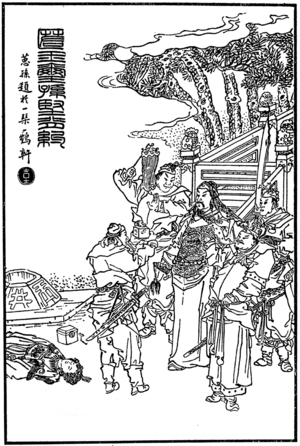
Sun Jian then led his forces to Dagu Pass, a strong pass protecting Luoyang from the south. Dong Zhuo personally fought at the Later Han tombs but was defeated. He fled to Mianchi and Shan, west of Luoyang. Sun Jian then marched into Luoyang, where he defeated Lü Bu's forces. Sun Jian ordered his men to re-seal the tombs of former emperors that Dong Zhuo had dug up. It is said that Sun Jian found the lost Imperial Seal in a well south of Luoyang and kept it.
Sun Jian then sent part of his army to Xin'an and Mianchi to threaten Dong Zhuo's defenses. Dong Zhuo sent his generals to various places to block any attacks from the east. After these arrangements, Dong Zhuo led his own troops to Chang'an.
After repairing the imperial tombs, Sun Jian led his army back to Luyang. The ruined Luoyang was too open to counterattacks from Dong Zhuo. The former capital of Luoyang was now empty.
The Coalition Falls Apart
Even with Sun Jian's successes, the coalition did not follow up on them. There was poor communication and teamwork among the leaders. The warlords in the east did not even know that Emperor Xian was still alive. Yuan Shao and Han Fu suggested making Liu Yu, a member of the imperial family, the new emperor. Cao Cao and Yuan Shu disagreed. When Yuan Shao and Han Fu sent a messenger to Liu Yu, Liu Yu strongly refused the offer. He said he was loyal to Emperor Xian and threatened to move north if Yuan Shao insisted. After many tries, Yuan Shao gave up. Also, the warlords stopped focusing on Dong Zhuo and started looking after their own interests.
Han Fu, who was in charge of supplies, slowly stopped providing for the coalition army. His general Qu Yi rebelled against him and joined Yuan Shao. This made Yuan Shao realize he needed to secure his own supplies. He secretly worked with Gongsun Zan to attack Han Fu's Ji Province. Eventually, Han Fu gave Ji Province to Yuan Shao.
Yuan Shao sent Zhou Yu (Renming) to attack Sun Jian, who was returning to join Yuan Shu. In the Battle of Yangcheng, Zhou Yu launched a surprise attack on Sun Jian's camp and captured it. Yuan Shu sent Gongsun Yue to help Sun Jian fight Zhou Yu. Gongsun Yue was killed in the battle, even though Sun Jian won. Gongsun Zan blamed Yuan Shao for Gongsun Yue's death and declared war on Yuan Shao. This led to the Battle of Jieqiao.
By this time, the coalition had failed and broken apart. It only existed in name.
Dong Zhuo's End
For the next year, the warlords did not take any action against Dong Zhuo. Dong Zhuo occasionally sent his army to attack the warlord Zhu Jun and take things from his land.
Dong Zhuo returned to being a tyrant in the government. He became even less tolerant of anyone who disagreed with him. Any official who said something slightly offensive would be killed immediately. He gave all his family members and relatives high-ranking government jobs. Even his baby sons were given titles and played with gold seals.
Government officials Wang Yun, Huang Wan, Shisun Rui, and Yang Zan planned to kill Dong Zhuo. They convinced Lü Bu to join them. Lü Bu's relationship with Dong Zhuo was getting worse because Dong Zhuo had once thrown an axe at him. Also, Lü Bu was having a secret relationship with one of Dong Zhuo's maids.
On May 22, 192, Dong Zhuo was on his way to a meeting in his chariot. Li Su came forward and stabbed him. Dong Zhuo called for Lü Bu to protect him, but Lü Bu killed him instead. Dong Zhuo's relatives were executed after his death. His body was left in the streets of Chang'an. An officer lit a wick in his belly button, and it burned for days because of the fat in his body.
After Dong Zhuo's death, some of his loyal followers, like Fan Chou, Guo Si, and Li Jue, ran away. They thought their loyalty to Dong Zhuo would be seen as treason. Wang Yun, who had taken control of the government, heard their plea for amnesty (forgiveness). He said, "Of all those who should be pardoned, they are the exceptions." Dong Zhuo's loyalists were very angry and started a war. Lü Bu and the imperial forces defeated them. However, Dong Zhuo's remaining forces managed to trick Lü Bu and take control of Chang'an. Wang Yun was killed.
After this, the power of the Eastern Han dynasty fell into the hands of Dong Zhuo's remaining followers. This gradually turned into a struggle for power that spread across the entire country.
In Romance of the Three Kingdoms
In the 14th-century historical novel Romance of the Three Kingdoms, the author Luo Guanzhong changed some details of this campaign. He did this to make the main characters seem more important. For example, there is historical proof that Liu Bei, Guan Yu, and Zhang Fei were in the campaign, but no specific great deeds are mentioned for them. Yet, in the novel, their achievements are much greater than Sun Jian's. Luo Guanzhong also simplified some historical events, made up fictional battles, and changed the order of events.
Because the novel is so popular, many people believe the events in it are true. They don't know the real history from sources like the Book of the Later Han or Records of the Three Kingdoms. This fictional story is also used in many Chinese operas and video games.
Starting the Uprising
In chapter 5 of Romance of the Three Kingdoms, Cao Cao tried to kill Dong Zhuo but failed. He escaped to his hometown. Then, Cao Cao sent secret messages, pretending they were from the emperor, to different regional warlords. He told them to rise up against Dong Zhuo. Many answered the call, forming the Anti-Dong Zhuo Coalition.
The novel has a slightly different list of people in the coalition:
- Cao Cao, a military officer.
- Yuan Shu, a general and administrator.
- Han Fu, Inspector of Ji Province.
- Kong Zhou, Inspector of Yu Province.
- Liu Dai, Inspector of Yan Province.
- Wang Kuang, Administrator of Henei.
- Zhang Miao, Administrator of Chenliu.
- Qiao Mao, Administrator of Dong Commandery.
- Yuan Yi, Administrator of Shanyang.
- Bao Xin, Chancellor of Jibei.
- Kong Rong, Administrator of Beihai.
- Zhang Chao, Administrator of Guangling.
- Tao Qian, Inspector of Xu Province.
- Ma Teng, Administrator of Western Liang.
- Gongsun Zan, Administrator of Beiping.
- Zhang Yang, Administrator of Shangdang.
- Sun Jian, Administrator of Changsha.
- Yuan Shao, Administrator of Bohai.
With eighteen warlords in the novel, the campaign is often called "The eighteen warlords' campaign against Dong Zhuo." In this story, Liu Bei, with his sworn brothers Guan Yu and Zhang Fei, offered their help to Gongsun Zan, who was Liu's friend. After the warlords joined the coalition, they insisted that Yuan Shao be the commander-in-chief. Yuan Shao accepted this role. Yuan Shao then put Yuan Shu in charge of supplies and appointed Sun Jian to lead the attack on Sishui Pass.
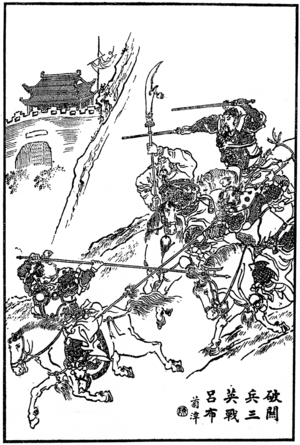
The Coalition Breaks Up
While restoring order in Luoyang, Sun Jian's men noticed a faint light from a well. He ordered them to get whatever was in the well. They found a dead woman with the Imperial Seal in a silk bag around her neck. Following advice, Sun Jian kept the Seal and told his men not to tell anyone.
However, one of his soldiers told Yuan Shao about it and was greatly rewarded. The next day, during a meeting, Sun Jian said he was sick and needed to return home. Yuan Shao then said sarcastically, "I know you're ill because of the Imperial Seal." Sun Jian was shocked. After arguments and denials, Yuan Shao and Sun Jian's men almost fought, but other coalition members stopped them. Sun Jian quickly fled Luoyang with his men. Angry, Yuan Shao sent a letter to Liu Biao of Jing Province, asking him to stop Sun Jian and capture him. This led to a conflict between Sun Jian and Liu Biao, which eventually resulted in Sun Jian's death at the Battle of Xiangyang.
The next day, Cao Cao returned to the main camp after his defeat in Xingyang. He complained about the lack of motivation in the coalition and also left. Gongsun Zan told Liu Bei, "Yuan Shao is not a good leader, and there will be trouble. We should leave." So, they also pulled their forces from the alliance and went north. Seeing that everyone had left, Yuan Shao broke up the camps and led his army back to his base.
|
 | Delilah Pierce |
 | Gordon Parks |
 | Augusta Savage |
 | Charles Ethan Porter |


